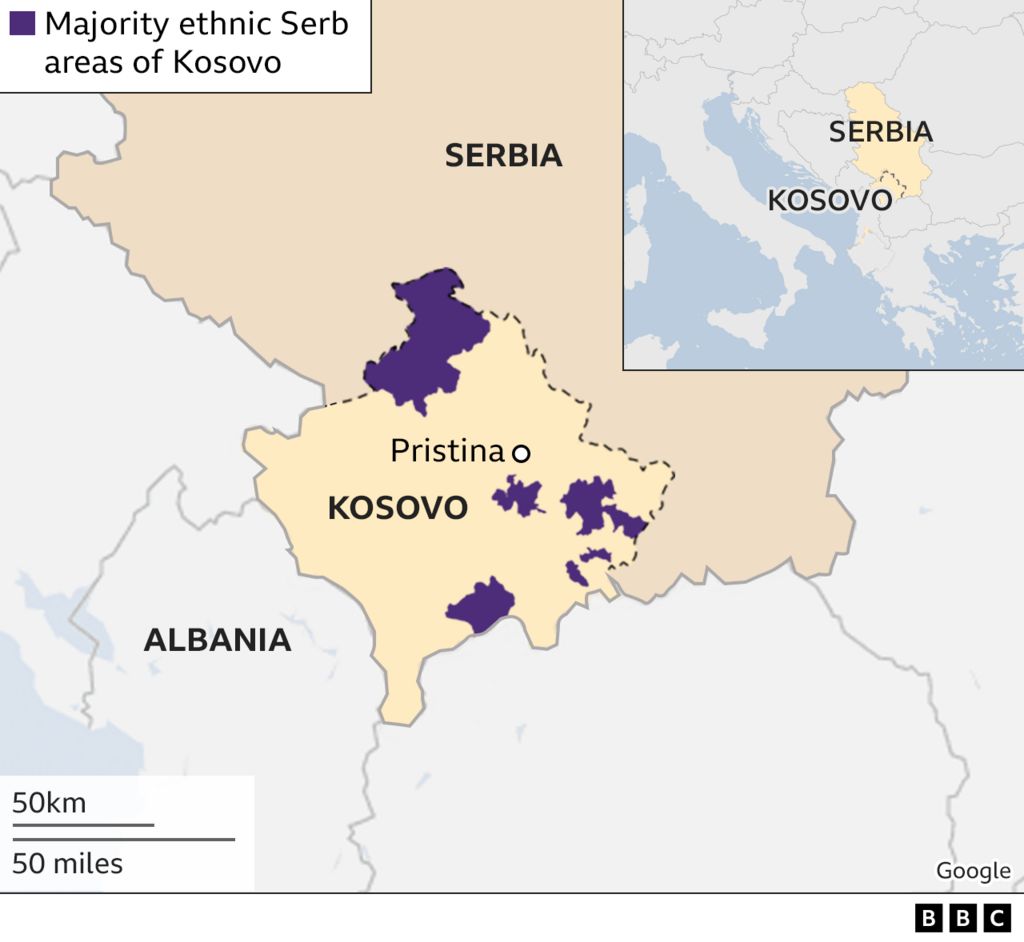NATO send 700 more troops to Kosovo

The US has announced measures against Kosovo for ignoring its advice to avoid raising tensions in majority-Serb northern areas.
It has criticised Kosovo's decision to install ethnic Albanian mayors in northern Kosovo "by forcible means".
Kosovo has been barred from taking part in an ongoing military exercise in Europe led by the United States.
On Monday, police and NATO troops battled with Serb protesters in Zvecan, north Kosovo.
Protesters attempted to storm a government facility amid outrage over the election of ethnic Albanian mayors in districts where Serbs outnumber them.
Nato is sending 700 more troops to Kosovo after 30 of its peacekeepers and 52 protestors were injured in the confrontations in Zvecan.
The crisis began in April, when ethnic Serbs boycotted municipal elections in north Kosovo, allowing ethnic Albanians to assume control of local councils with less than 4% turnout.
The European Union, like the United States, has accused the Kosovan authorities of destabilising the situation in north Kosovo and has warned against any moves that could exacerbate ethnic tensions there.
After years of tense relations between its Serb and primarily Albanian populations, Kosovo declared independence from Serbia in February 2008.
It has been recognised by the United States and key European Union countries. However, Serbia, backed by its powerful ally Russia, refuses to do so, as do the majority of ethnic Serbs in Kosovo.
While ethnic Albanians make up more than 90% of the population in Kosovo overall, Serbs make up the majority in the northern region.
- Profile of Kosovo
- Kosovo-Serbia row leaves Nato peacekeepers under attack
According to Jeffrey Hovenier, the US ambassador in Pristina, the US "foresaw the consequences" of the plan to forcibly install ethnic-Albanian mayors in four majority-Serb communities.
The United States, a close ally of Kosovo, claimed it "strongly advised" Prime Minister Albin Kurti to modify his course of action, but he ignored the suggestion.
As a result, Kosovo's participation in NATO's Defender Europe 23 exercise has been cancelled.
Mr Hovenier stated that the US is evaluating other options and now "has no enthusiasm" to assist Kosovo in its aspirations to acquire greater international recognition or proceed towards EU and Nato membership.
The presidents of Serbia and Kosovo have traded accusations over the violent events.
Serbian President Aleksandar Vucic stated that Kosovan Prime Minister Albin Kurti is "solely responsible."
In return, Mr Kurti claimed the protesters in Zvecan were "a bunch of extremists under the direction of official Belgrade".
The alliance's chief Jens Stoltenberg said the violence "must stop".
He strongly condemned "the unprovoked attacks against Kfor troops" - referring to Nato's peacekeeping force in Kosovo.
But ethnic Serbs in north Kosovo have criticised Kfor for failing to prevent armed Kosovo police from forcing their way into municipal buildings and removing Serbian flags.
Nato's declaration on Tuesday significantly boosts Kfor's figures. The 700 extra troops will join the 3,800 already on the ground in Kosovo.
If necessary, an extra reserve battalion has been placed on standby and will be ready to deploy in seven days.
The objective of Kfor is to ensure the safety and freedom of movement of all people in Kosovo, regardless of ethnicity.
As a result of this week's upheavals, the incoming forces will face high expectations from both sides.
Former NATO Secretary General Lord Robertson has accused Serbia of inciting unrest in Kosovo.
"The idea that we would withdraw completely from Kosovo can't happen until Serbia begins to acknowledge reality," he said on BBC Radio 4's World Tonight after returning from a trip to Kosovo.
Noting the Americans' "salutary warning" to the Kosovan government, he stated that "a degree of common sense and a degree of cool diplomacy should've been the order of the day."
"I think the Kosovan authorities should've handled it much better," he says. "The fact that their close friends, such as the Americans, are issuing sharp warnings should cause them to reconsider their actions."
He chastised both Kosovo and Serbia, saying they needed to "sit down carefully and consider what future they want for the people of both countries."



